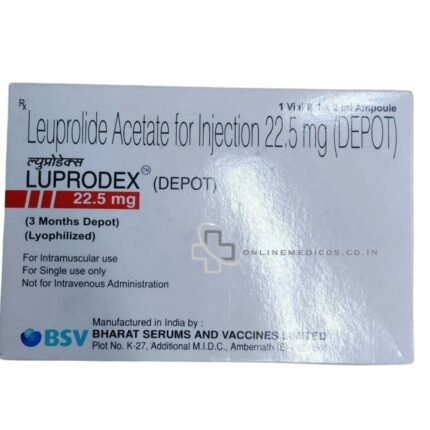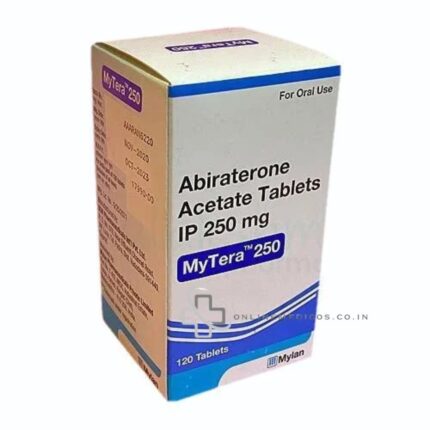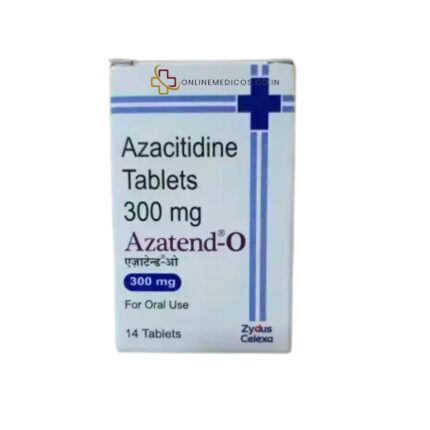

Bevacirel 100mg Injection
₹19,900.00 Original price was: ₹19,900.00.₹4,500.00Current price is: ₹4,500.00.
![]() Prescription Required
Prescription Required
![]() Cold chain
Cold chain
Salt : Bevacizumab
Manufacturer : RELIANCE LIFE SCIENCES PVT LTD
Packing : 4 ml in 1 vial
Prepaid Only, Non-Returnab
1. Product Introduction
Bevacirel 100mg Injection is a prescription medicine containing Bevacizumab, a recombinant humanized monoclonal antibody used primarily in cancer treatment. Bevacizumab is classified as a vascular endothelial growth factor (VEGF) inhibitor, which works by inhibiting the formation of new blood vessels (angiogenesis) that tumors need to grow and spread. By blocking VEGF, Bevacizumab starves the tumor of its blood supply, thus slowing or stopping its growth.
Bevacirel 100mg is administered intravenously by a healthcare professional in a clinical setting. It is used either alone or in combination with chemotherapy to treat several types of cancer, including colorectal cancer, lung cancer, kidney cancer, ovarian cancer, and glioblastoma.
This medicine is a vital part of targeted cancer therapy, and its role is particularly important in advanced or metastatic cancers. It is well-researched, widely used, and recommended in various national and international treatment guidelines.
2. Uses of Bevacirel 100mg Injection
Bevacirel 100mg is used in the treatment of various cancers, particularly those that are advanced or have metastasized. Common indications include:
-
Metastatic Colorectal Cancer (mCRC):
Used in combination with chemotherapy (like 5-FU-based regimens) to improve progression-free survival. -
Non-Small Cell Lung Cancer (NSCLC):
Often combined with platinum-based chemotherapy to treat advanced or recurrent disease. -
Renal Cell Carcinoma (Kidney Cancer):
Used in combination with interferon alfa for advanced kidney cancer. -
Cervical Cancer and Ovarian Cancer:
Especially in persistent, recurrent, or metastatic cases when combined with chemotherapy. -
Glioblastoma Multiforme (Brain Cancer):
Approved for use in recurrent glioblastoma where other treatments have failed. -
Hepatocellular Carcinoma (Liver Cancer):
In combination with other agents as part of first-line treatment in unresectable cases. -
Breast Cancer (off-label in some regions):
Though not universally approved, it is sometimes used in triple-negative breast cancer as part of individualized treatment plans.
3. Benefits of Bevacirel 100mg Injection
-
Targeted Therapy:
Unlike traditional chemotherapy that affects both cancerous and healthy cells, Bevacirel specifically targets blood vessels feeding the tumor, making it more selective and effective. -
Improves Survival:
When used with chemotherapy, Bevacizumab has shown significant improvements in overall survival and progression-free survival in various cancers. -
Reduces Tumor Growth and Spread:
By inhibiting angiogenesis, the medication limits the tumor’s ability to grow and metastasize. -
Versatile Cancer Treatment:
Effective in treating a wide range of solid tumors, especially advanced and metastatic cancers. -
Enhances Chemotherapy:
Bevacirel boosts the effectiveness of chemotherapy agents by normalizing blood vessels in tumors, improving drug delivery.
4. Side Effects
Like all powerful anti-cancer agents, Bevacirel 100mg Injection may cause some side effects. Most are manageable under medical supervision, but it’s important for patients to report any unusual symptoms.
Common Side Effects:
-
High blood pressure (hypertension)
-
Fatigue or weakness
-
Nosebleeds
-
Diarrhea
-
Loss of appetite
-
Mouth sores
-
Delayed wound healing
-
Protein in the urine
Serious Side Effects (Less Common):
-
Gastrointestinal perforation (tear in the stomach or intestines)
-
Blood clots (stroke or heart attack)
-
Severe bleeding
-
Kidney problems (including nephrotic syndrome)
-
Infusion-related reactions (fever, chills, difficulty breathing)
Precautions:
-
Avoid during pregnancy; it may harm the unborn baby.
-
Patients undergoing surgery should delay Bevacizumab due to the risk of poor wound healing.
-
Regular monitoring of blood pressure, urine protein levels, and renal function is advised.
5. Frequently Asked Questions (FAQ)
Q1. What is Bevacirel 100mg Injection used for?
A: It is used for treating various types of advanced or metastatic cancers, such as colorectal, lung, kidney, brain, ovarian, and cervical cancers.
Q2. How does Bevacizumab work?
A: Bevacizumab blocks a protein called VEGF that promotes the growth of blood vessels in tumors. By inhibiting this protein, it cuts off the blood supply to cancer cells, thereby stopping tumor growth.
Q3. How is this injection given?
A: Bevacirel is given as an intravenous (IV) infusion under the supervision of a trained healthcare professional. The infusion typically takes between 30 to 90 minutes.
Q4. Is Bevacirel chemotherapy?
A: No, it is not traditional chemotherapy. It is a targeted monoclonal antibody therapy, often used in combination with chemotherapy.
Q5. Can Bevacirel cure cancer?
A: Bevacirel does not cure cancer but helps in slowing down tumor progression, improving quality of life, and extending survival in patients with advanced cancer.
References
-
Chabner BA, Barnes J, Neal J, et al. Targeted Therapies: Tyrosine Kinase Inhibitors, Monoclonal Antibodies, and Cytokines. In: Brunton LL, Chabner BA, Knollmann BC, editors. Goodman & Gilman’s: The Pharmacological Basis of Therapeutics. 12th ed. New York, New York: McGraw-Hill Medical; 2011. pp. 1739-40.
-
Chu E, Sartorelli AC. Cancer Chemotherapy. In: Katzung BG, Masters SB, Trevor AJ, editors. Basic and Clinical Pharmacology. 11th ed. New Delhi, India: Tata McGraw Hill Education Private Limited; 2009. p. 955.
-
Briggs GG, Freeman RK, editors. A Reference Guide to Fetal and Neonatal Risk: Drugs in Pregnancy and Lactation. 10th ed. Philadelphia, PA: Wolters Kluwer Health; 2015. pp. 142-43.
-
Drugs and Lactation Database (LactMed) [Internet]. Bethesda (MD): National Library of Medicine (US); 2006. Bevacizumab. [Updated 2019 Jul 20]. [Accessed 18 Feb. 2020] (online) Available from:

Disclaimer
Online Medicos primary intention is to ensure that its consumers get information that is reviewed by experts, accurate and trustworthy. The information and contents of this website are for informational purposes only. They are not intended to be a substitute for professional medical advice, diagnosis, or treatment. Please seek the advice of your doctor and discuss all your queries related to any disease or medicine. Do not disregard professional medical advice or delay in seeking it because of something you have read on Online Medicos Our mission is to support, not replace, the doctor-patient relationship.


Shipping Policy
We ship across India. Note – this is subject to change as per Company Wishes. Packages will be shipped in 24 working hours. we are closed on Sundays and will reach you in the next 2-4 days post shipping. We give the estimated time of delivery on the shipping page. However, these are indicative and depend on our shipping partner.
Delivery
The delivery times are subject to location, distance, and our logistics partners. We are not liable for any delays in delivery by the courier company/postal authorities but will help you track down a package through our partner courier services.
Your purchases may reach you from various locations in more than one package. But rest assured, you will be charged one delivery fee for the entire order. As soon as your package ships, we will email you your package tracking information.
We are bound in coverage by their reach even though we use some of India’s largest logistics companies for shipping. In case your address is in a location not served by them we would contact you to find an alternative solution to make your products reach you.









Reviews
There are no reviews yet.